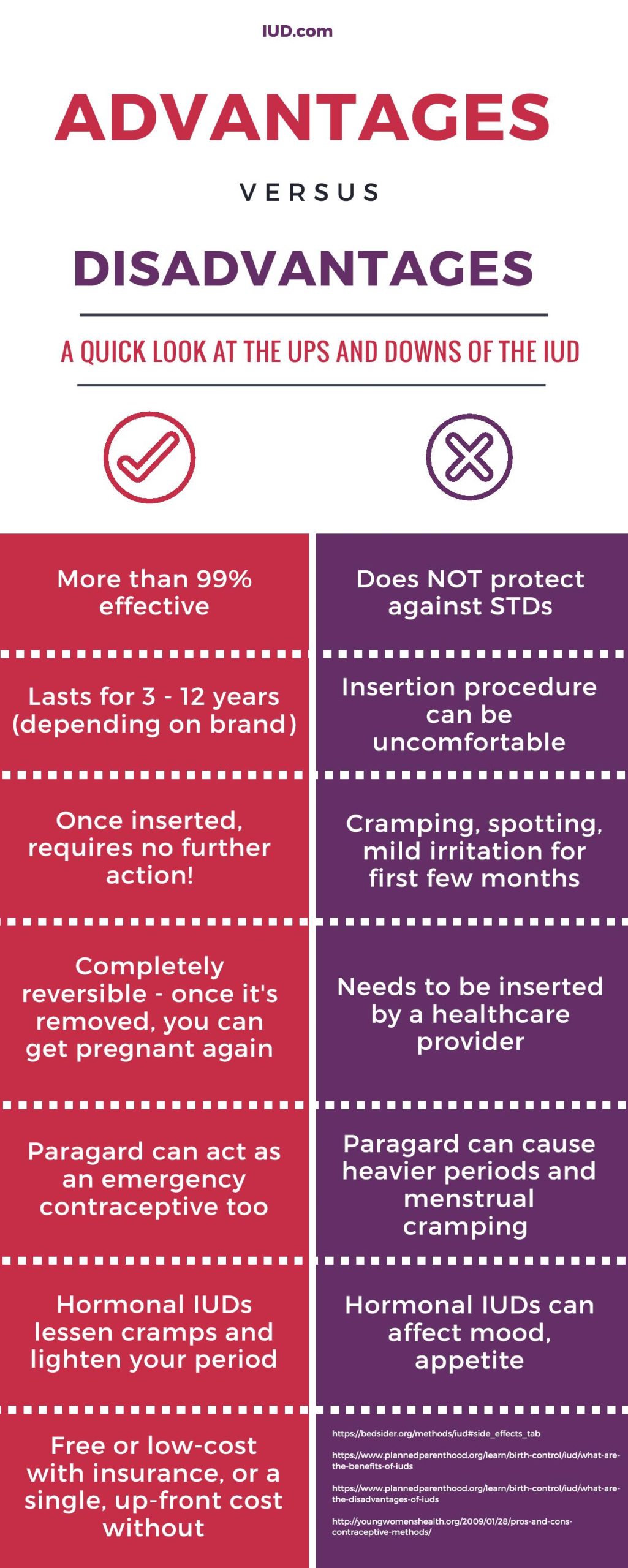Benefits of an IUD
An intrauterine device (IUD) is a highly effective and convenient form of birth control that offers numerous benefits to women. In this article, we will explore the advantages of using an IUD and how it can positively impact your reproductive health.
Long-Lasting Contraception
An IUD provides long-term contraception, offering peace of mind for up to 3 to 10 years, depending on the type. Once inserted into the uterus by a healthcare professional, you can forget about it and enjoy worry-free contraception. This makes it a suitable option for women who want to delay or space out pregnancies without the hassle of daily reminders.
Highly Effective
IUDs are one of the most effective forms of birth control available. They have a failure rate of less than 1%, making them a reliable choice for preventing unintended pregnancies. Unlike birth control pills, which require strict adherence to a daily schedule, an IUD eliminates the risk of human error.
Hormonal and Non-Hormonal Options
There are two main types of IUDs: hormonal and non-hormonal. Hormonal IUDs release a small amount of progestin, a synthetic hormone, which thickens the cervical mucus, making it difficult for sperm to reach the egg. Non-hormonal IUDs, on the other hand, are made of copper, which creates an inhospitable environment for sperm, preventing fertilization. The choice between hormonal and non-hormonal IUDs allows women to select the option that best suits their individual needs and preferences.
Reduced Menstrual Symptoms
For women who experience heavy or painful periods, hormonal IUDs can provide relief. The progestin in these IUDs can help reduce menstrual flow and alleviate cramps. Some women may even experience a decrease in the frequency of their periods. Non-hormonal IUDs, although not directly targeting menstrual symptoms, do not worsen them either.
Lower Risk of Pelvic Inflammatory Disease
Using an IUD can lower the risk of developing pelvic inflammatory disease (PID), a serious infection of the reproductive organs. The risk of PID is primarily associated with sexually transmitted infections (STIs) contracted around the time of IUD insertion. However, with proper screening for STIs and adherence to safe sex practices, the risk of PID remains minimal.
Quick Reversibility
If you decide to become pregnant or no longer wish to use an IUD, it can be easily removed by a healthcare professional. Unlike other forms of birth control, such as sterilization, the effects of an IUD are reversible, allowing you to regain fertility shortly after removal.
Cost-Effective
While the upfront cost of an IUD may be higher compared to other forms of contraception, it is a cost-effective option in the long run. With its long-lasting nature, you can save money on monthly contraceptive expenses over the years. Additionally, many insurance plans cover the cost of IUDs, making them more accessible and affordable for women.

An IUD offers numerous benefits, including long-lasting contraception, high effectiveness, and the availability of both hormonal and non-hormonal options. It can help reduce menstrual symptoms, lower the risk of pelvic inflammatory disease, and provide a quick and reversible form of birth control. With its cost-effectiveness and convenience, an IUD is an excellent choice for women seeking reliable and hassle-free contraception.
Frequently Asked Questions
1. What is an IUD?
An IUD (Intrauterine Device) is a small, T-shaped contraceptive device that is inserted into the uterus to prevent pregnancy.
2. How does an IUD work?
An IUD works by releasing either copper or hormones into the uterus, which prevents sperm from fertilizing the egg or alters the uterine lining to prevent implantation.
3. What are the benefits of using an IUD?
Some benefits of using an IUD include:
Highly effective in preventing pregnancy
Long-lasting contraception (up to 3-12 years depending on the type)
Convenience – no need to remember to take a daily pill
Does not interfere with sexual intercourse
Can be used while breastfeeding
Reduced menstrual bleeding and cramps (hormonal IUDs)
4. Are there any side effects of using an IUD?
Some common side effects of using an IUD include:
Cramping or discomfort during insertion
Irregular bleeding or spotting
Backaches or lower abdominal pain
Expulsion of the IUD (rare)
Perforation of the uterus (extremely rare)
5. How effective is an IUD in preventing pregnancy?
IUDs are more than 99% effective in preventing pregnancy, making them one of the most reliable forms of contraception available.
6. Can I have an IUD inserted if I haven’t had children?
Yes, even women who have not had children can have an IUD inserted. It is a safe and effective contraceptive option for all women.
7. Can IUDs protect against sexually transmitted infections (STIs)?
No, IUDs do not protect against STIs. They only provide contraception and do not act as a barrier to prevent the transmission of STIs. Using condoms is recommended for STI protection.
8. Can I remove the IUD whenever I want?
Yes, the IUD can be removed by a healthcare professional at any time if you decide you no longer want to use it. Fertility usually returns immediately after removal.
9. Are there any restrictions on using an IUD?
IUDs are generally safe for most women. However, they may not be suitable for those with certain medical conditions or uterine abnormalities. It is important to consult with a healthcare provider to determine if an IUD is the right choice for you.
10. How much does an IUD cost?
The cost of an IUD can vary depending on factors such as the type of IUD and your location. In many countries, IUDs are covered by health insurance plans. It is best to check with your insurance provider or healthcare professional for specific cost information.




